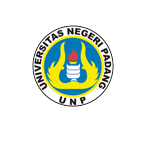The design and development of Bachelor Program of Educational Technology (BPET) curriculum refers to the Indonesian Qualification Framework (IQF) at level 6. IQF level 6 position is equivalent to level 5 ASEAN Qualification Reference Framework (AQRF) and level 6 European Qualification Framework (EQF). The competencies that must be possessed at this level can be seen in the Table 1. The competencies that must be possessed at this level can be seen in Table 1. The relationship between the Program Learning Outcomes (PLO), Program Educational Objectives (PEO), and KKNI/IQF can be seen in Table 2.
Tabel 1. KKNI/ IQF Level 6
| No. | KKNI/ IQF Level 6 |
| 1. | Mastering the theoretical concepts of certain fields of knowledge in general and the theoretical concepts of special sections in these fields of knowledge in depth, and able to formulate procedural problem solving. |
| 2. | Able to apply their field of expertise and utilize Science, Technology and the Arts in their field in problem solving and able to adapt to the situation at hand. |
| 3. | Able to make the right decisions based on analysis of information and data, and able to provide guidance in choosing various alternative solutions independently and in groups. |
| 4. | Responsible for own work and can be given responsibility for the achievement of organizational work results. |
Tabel 2. Relationship Matrix Between PEO, PLO and KKNI (IQF) BPET
| No. | Program Learning Outcomes (PLO) | Program Educational Objectives (PEO) | KKNI (IQF) | ||
| 1 | 2 | 3 | |||
| 1. | Demonstrate scientific, educative, responsible, independent and religious attitudes and behavior to improve the quality of life in society, nation and state based on academic norms and ethics. | √ | √ | √ | 6.4 |
| 2. | Understanding the concept of educational technology. | √ | √ | 6.1 | |
| 3. | Understanding the domains of educational technology namely design, development, implementation, management, and evaluation. | √ | √ | 6.1 | |
| 4. | Understanding the concept of research methodology in the scope of educational technology. | √ | √ | 6.1 | |
| 5. | Having the ability to innovate, integrate the learning and life skills, and master the information, communication, and technology. | √ | √ | √ | 6.3 |
| 6. | Having the ability to apply the scientific and innovative thinking in the process of knowledge and technology development which is relevant to educational technology. | √ | √ | 6.2 | |
| 7. | Formulating the problem solving in educational technology issues found in learning and training activities. | √ | √ | 6.3 | |
| 8. | Conducting the activities of design, development, implementation, management, and evaluation in the scope of educational technology. | √ | √ | 6.2 | |
| 9. | Conducting the research and dissemination of research result in the scope of educational technology. | √ | √ | 6.2 | |
